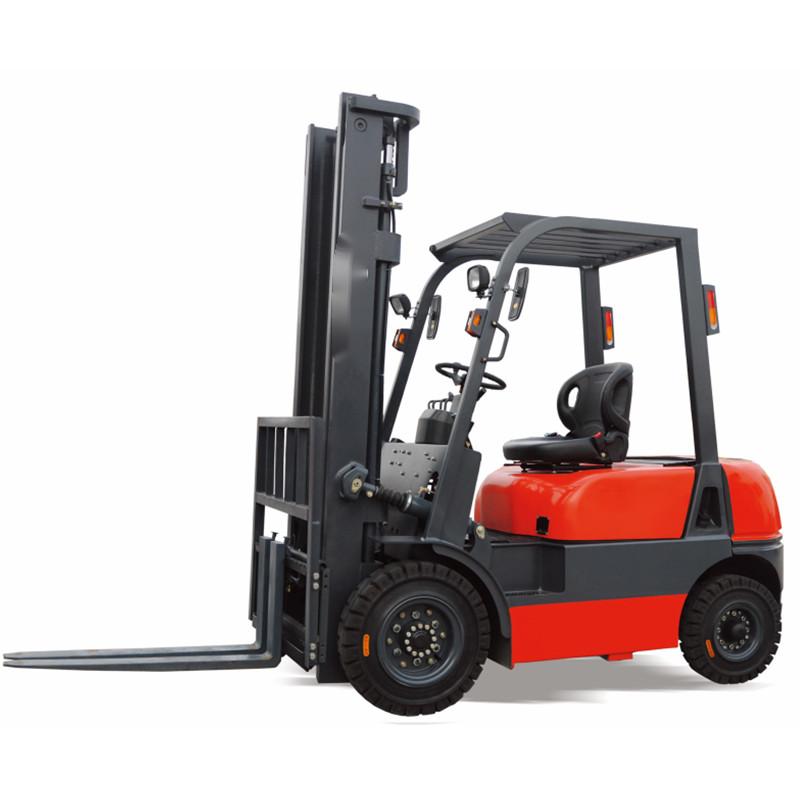In the fields of modern logistics and industrial production, electric forklifts are rapidly emerging as the core equipment for material handling. Compared with traditional internal combustion forklifts, electric forklifts, with their remarkable advantages, are gradually transforming the operation mode of the industry, bringing more efficient, environmentally friendly, and cost-effective material handling solutions to enterprises.

Environmental Pioneer: Zero-emission Operation
One of the greatest advantages of electric forklifts lies in their environmental performance. Taking internal combustion forklifts as a reference, the latter continuously emit pollutants such as carbon monoxide, nitrogen oxides, and particulate matter during operation, seriously affecting indoor and outdoor air quality. In contrast, electric forklifts are powered by electricity, achieving true zero exhaust emissions. This makes them particularly suitable for indoor environments with strict air quality requirements, such as food processing workshops, pharmaceutical warehouses, and electronics manufacturing factories. In these places, electric forklifts can ensure that the production environment remains unpolluted, safeguard product quality and the health of employees, and create a clean and safe working space for enterprises.
Economic Efficiency: Reducing Operational Costs
From the perspective of long-term operating costs, electric forklifts demonstrate significant economic benefits. Although their initial purchase cost is slightly higher than that of internal combustion forklifts, the cost advantages gradually become apparent during subsequent use. Firstly, the cost of electricity is lower than that of fuel. Calculated based on the same amount of work, the energy consumption cost of electric forklifts can be reduced by about 30% - 50%. Secondly, the maintenance of electric forklifts is simpler and less expensive. Their power system has a relatively simple structure with fewer components, reducing the probability of wear and failures. Daily maintenance mainly focuses on the battery, motor, and electronic control system. With a long maintenance cycle, maintenance costs are significantly reduced. According to statistics, the annual maintenance cost of electric forklifts can be 20% - 30% lower than that of internal combustion forklifts, saving enterprises a large amount of capital in the long run.
Excellent Performance: Precise Control and Efficient Operation
Electric forklifts also perform outstandingly in terms of performance. The advanced electronic control system endows them with precise control capabilities, allowing operators to easily achieve accurate loading, unloading, and handling of goods, improving operational efficiency and accuracy. Compared with internal combustion forklifts, electric forklifts have better acceleration performance, start quickly, and can reach the maximum driving speed in a short time, greatly shortening the time of a single operation. At the same time, the lifting speed and lifting height of electric forklifts can meet the needs of most logistics and industrial applications. Whether in the narrow aisles between warehouse shelves or in the cargo loading and unloading areas of large logistics centers, they can complete tasks efficiently. In addition, electric forklifts operate with extremely low noise, usually 10 - 15 decibels lower than internal combustion forklifts. This not only improves the working environment and reduces damage to employees' hearing but also enables operations in noise-sensitive areas, such as warehouses near hospitals and schools.
Wide Application: Adaptable to Multiple Scenarios
Logistics and Warehousing: In large logistics warehouses and distribution centers, electric forklifts undertake the key tasks of goods warehousing, storage, sorting, and outbound. With their flexible steering performance and precise control capabilities, they can freely navigate among dense shelves, efficiently complete the handling and stacking of goods, and significantly improve the utilization rate of warehouse space and the efficiency of logistics turnover.
Manufacturing Industry: In various manufacturing plants, electric forklifts play an indispensable role in the handling of raw materials and the circulation of semi-finished and finished products. In manufacturing industries with strict requirements for the production environment, such as electronics, automobiles, and home appliances, the zero-emission and low-noise characteristics of electric forklifts are particularly important. They can ensure that the production process is free from pollution and interference, and guarantee the efficient and stable operation of the production line.
Cold Chain Logistics: The low-temperature environment places higher demands on the performance and reliability of forklifts. Electric forklifts, with their good cold resistance and stable power output, have become an ideal choice for cold chain logistics. In cold storage facilities and refrigerated warehouses, electric forklifts can continuously operate under low-temperature conditions, quickly complete the loading, unloading, and handling of goods, and meet the strict time-sensitive requirements of cold chain logistics.
Ports and Terminals: Despite the complex operating environment in ports and the extremely high requirements for the load-bearing capacity and durability of forklifts, electric forklifts are gradually making a name for themselves in the field of port loading and unloading, thanks to their powerful power and environmental advantages. In some ports with strict environmental protection standards, electric forklifts are used for the short-distance handling of containers and the loading and unloading of goods, effectively reducing air pollution in port areas while improving operational efficiency.
Manufacturing Industry: In various manufacturing plants, electric forklifts play an indispensable role in the handling of raw materials and the circulation of semi-finished and finished products. In manufacturing industries with strict requirements for the production environment, such as electronics, automobiles, and home appliances, the zero-emission and low-noise characteristics of electric forklifts are particularly important. They can ensure that the production process is free from pollution and interference, and guarantee the efficient and stable operation of the production line.
Cold Chain Logistics: The low-temperature environment places higher demands on the performance and reliability of forklifts. Electric forklifts, with their good cold resistance and stable power output, have become an ideal choice for cold chain logistics. In cold storage facilities and refrigerated warehouses, electric forklifts can continuously operate under low-temperature conditions, quickly complete the loading, unloading, and handling of goods, and meet the strict time-sensitive requirements of cold chain logistics.
Ports and Terminals: Despite the complex operating environment in ports and the extremely high requirements for the load-bearing capacity and durability of forklifts, electric forklifts are gradually making a name for themselves in the field of port loading and unloading, thanks to their powerful power and environmental advantages. In some ports with strict environmental protection standards, electric forklifts are used for the short-distance handling of containers and the loading and unloading of goods, effectively reducing air pollution in port areas while improving operational efficiency.
With the continuous progress and innovation of technology, electric forklifts will continue to improve in terms of performance, battery life, and intelligence level, bringing higher-quality and more efficient material handling solutions to more industries. In today's era of pursuing green development and efficient operation, electric forklifts are undoubtedly a wise choice for enterprises to enhance their competitiveness and achieve sustainable development.


